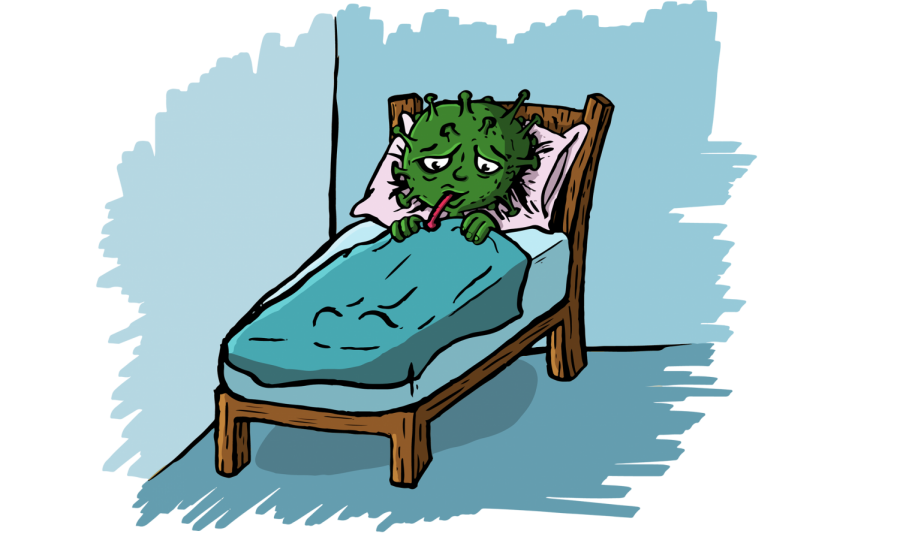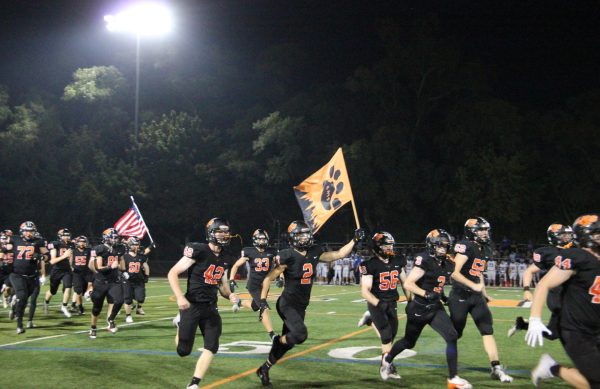Testing Positive: What Covid-19 has been like for some students
According to the Centers for Disease Control and Prevention (CDC), more than 13.6 million cases of Covid-19 have been reported in the United States since Jan. 21. Of those, more than 40,000 were detected in Lake County, including at least two dozen students and staff at LHS.
Those who test positive for Covid experience a variety of symptoms. Some have flu and cold-like symptoms, such as a runny nose, cough or a fever. Others have symptoms more unique to Covid, such as loss of taste and smell, or body aches. While many people who are relatively healthy can still catch Covid, those most at risk are 65 years old and above, as well as people with underlying health conditions, according to the CDC.
Activities such as traveling, going out in public without a mask, and gathering in groups of 25 or more can severely put the participants and their families at risk.
“Regardless of how safe you are, you are going to be at risk for getting Covid,” junior Callie Leighton explains.
Leighton tested positive for Covid-19 on Nov. 7.
“I picked my brother up from [soccer] practice, and he was complaining he wasn’t feeling well,” she explained. “But [it] was cold, so we didn’t really think anything of it.” Leighton and her family continued their week, until she felt unwell.
“I woke up [later that week] and I was super tired, but I didn’t have a fever,” she remarked. She figured that she “didn’t sleep enough, or had a cold.” Leighton texted a small group of friends and told them she was feeling tired but didn’t have a fever. Leighton “took [some] aspirin” and felt good as new. They said they all were comfortable with her being around them, so they spent some time together.
Then her father got a fever. “His body, I think, runs like a machine. His temperature was literally point three off, and he knew something was wrong,” Leighton explained. Her dad went to get a test, and it came back positive.
Leighton, her mom and younger brother all went in to get tested. All three came back positive.
“My mom and brother didn’t have any [symptoms], but my dad and I got the worst of it,” she added. “[My] symptoms really only were a cough, chills, and some headaches. My dad was similar, but he had a fever for most of it.”
Alternatively, senior Jamie Nicolas tested positive for Covid on June 24 but had no symptoms at all.
“My brother had to get tested for work, so I went with him [because] why not?” she remarked. Nicolas tested positive, and so did her brother; yet she had no symptoms.
“I had a headache for [maybe] the first day, but who knows if that was because of Covid,” she explained.
“I have no idea where I could have gotten it from. I have been really good about washing my hands, not going out to stores unless necessary, and keeping my circle small,” she added. “That really goes to show that you can get it anywhere, and to not look over simple things like wearing a mask and washing your hands. It’s not always the big parties.”
Nicolas remarked that the “quarantine for two weeks was harder than any of the minimal symptoms I had.”
Freshman at the University of Minnesota and LHS graduate Claire Larson had a similar experience.
Larson visited her soon-to-be college roommate, who lived in Minnesota, over the summer. On her way home, her roommate called Larson and informed her that she had tested positive for Covid. Immediately, Larson called her family to warn them.
“They set a table up in my room so I could eat, [and] right when I got home, I went up to my room,” she explained.
Later that week in July, she got tested and results came back positive.
Larson experienced a large variety of symptoms. “It was possibly the worst pain I have ever felt. The body aches were unbearable,” Larson explained.
Along with body aches and a high fever, Larson lost her sense of taste and smell.
“Losing that,” she explained, “was worse than anything. I didn’t want to eat anymore because I couldn’t taste anything. And [that] just made me more sick.” Along with not eating, Larson said she experienced severe depressive feelings as a result of being in quarantine.
“I felt so alone. [My] parents are older, so I could barely even interact with them. Quarantine was awful; I wouldn’t wish [it] upon anyone,” she expressed. “My friends didn’t do a great job about reaching out. Even a FaceTime call would have made all the difference.”
According to the CDC, many other Americans have felt the same way as Larson. As of June, 47% of American adults claimed that quarantine and worrying about Covid-19 has had a negative impact on their mental health.
Junior Owen Haywood explained what quarantine was like for him: “It really made me question everything and put what is going on around me into perspective. Being alone gives you a lot of time to reflect, which was something I needed.”
Haywood tested positive for Covid on Nov. 10, along with the rest of his family.
“I didn’t have an awful experience physically with having Covid. I was [relatively] asymptomatic besides a cough,” Haywood claimed. “But it was tough mentally. You feel so isolated and alone in the world. You feel like you’re starting to go crazy.”
Haywood also wanted to emphasize the importance of the CDC’s recommended precautions.
“Being someone who had [Covid], it is so frustrating to see people going to parties. It’s selfish. While young people may not have serious symptoms of being sick, your parents might,” he said. “It’s the youth’s responsibility to keep everyone else around us safe. I associate being a good citizen with wearing a mask and being safe.”
Haywood’s perspective on the CDC guidelines is similar to Larson’s.
“What really gets to me is the blatant selfishness people are expressing right now. It may not affect you personally, but you never know who you could pass it to,” she explained.
Leighton explained how she felt knowing she gave Covid to her friends.
“The guilt that I felt knowing I put my friends and their families at risk was overwhelming. To possibly put their grandparents or family members with underlying health issues at serious risk, I couldn’t live with myself,” she explained. “If you aren’t social distancing to keep yourself safe, think about others.”
“Covid is real,” Leighton remarked. “To not take it seriously is truly a show of character. And your peers will remember that for the rest of their lives. This virus is taking lives, and not everyone is treating it that way. Keep others safe, be a good person.”










Jodi Zombolo • Dec 17, 2020 at 4:43 pm
Great article Ellie. And thank you to those students who shared their stories! So important to stay safe and keep others safe.